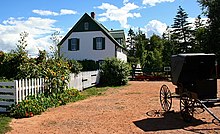| Green Gables House | |
|---|---|

The Green Gables farmhouse viewed from the north.
| |
| Location | Cavendish, Prince Edward Island |
| Coordinates | 46°29′16″N 63°22′55.4″WCoordinates: 46°29′16″N 63°22′55.4″W |
| Area | 1 hectare (2.5 acres) |
| Built | 1831-1870 |
| Architect | David MacNeill (original builder and owner) |
| Governing body | Parks Canada |
| Type | National Historic Site of Canada |
| Designated | July 10, 1985 |
Green Gables is the name of a 19th-century farm in Cavendish, Prince Edward Island, and is one of the most notable literary landmarks in Canada.[1] The Green Gables farm and its surroundings are the setting for the popular Anne of Green Gables novels by Lucy Maud Montgomery. The site is also known as Green Gables Heritage Place. The house was designated a National Historic Site in 1985[2] and the complex is located within Prince Edward Island National Park.
History[edit]
The Green Gables farm was owned by the MacNeill family, who were cousins of author Lucy Maud Montgomery. The farm's name is derived from the rich dark green paint of the gables on the farmhouse. The main exterior walls of the farmhouse are painted white.
Montgomery visited the farm as a young girl and based the location of her best-selling Anne series of books on the Green Gables farm. She drew romantic inspiration from the house, as well as the surrounding area, including the "Haunted Woods", "Lovers' Lane", and "Balsam Hollow."
Upon Montgomery's death in 1942, her wake was conducted from the living room of the Green Gables farmhouse for several days prior to her funeral at the local Presbyterian church and burial in the nearby Cavendish Community Cemetery.
Tourism and national park status[edit]
The international acclaim of Montgomery's novels made Cavendish into a popular tourist destination in the province beginning in the early 20th century. This led to the establishment of Prince Edward Island National Park in the 1930s. The park's boundaries encompassed the Green Gables homestead, and the building became the property of the Government of Canada.
The farmland surrounding Green Gables house was developed into, designed by world-renowned architect Stanley Thompson.
In addition to being located within park boundaries, the Green Gables farmhouse is designated a National Historic Site for its importance in literary history, and is one of the most-visited historic sites in the country. The farmhouse exterior has not changed significantly over time, and its interior decor and artifacts depict the late Victorian Period in rural Prince Edward Island. Guided and self-guided tours may be taken of the house and surroundings, with Parks Canada interpretive staff available throughout the site. Various rooms in the house have been named according to the Anne of Green Gables story.
Restoration[edit]
An electrical fire on May 23, 1997 caused some internal damage to part of the upstairs section of the farmhouse. This led to restoration of the affected rooms, as well as being the impetus for an extensive redevelopment of the property through the construction of barns and outbuildings to complement the house itself and to accommodate visitor interpretation facilities. As a result, part of the nearby Green Gables golf course, constructed in the 1930s, was moved away from the vicinity of the homestead and the area has been returned to a more traditional agricultural landscape.
Disclaimer
The above comments are based on my personal travel experiences to this particular location in the summer months. Your experience may vary due to weather and traffic.
My trips were not sponsored by any of the authorities and my comments are not biased or representing any views of governing bodies.
History and information extracted from Wikipedia and photos were selected from Google images and all rights reserved with original owners.
This is only for an informational purpose. Not for commercial use.

Note.
Hope you will enjoy your visit. Please make your comments, suggestions & travel questions. I am happy to provide information on my earliest convenience & update the post accordingly.














No comments:
Post a Comment